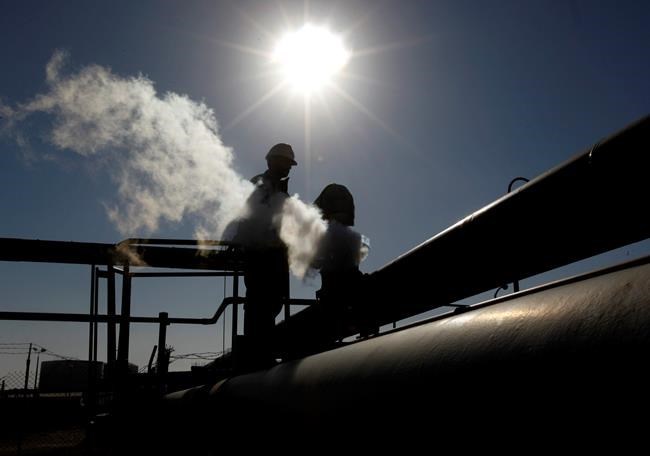
FILE - In this Feb. 26, 2011 file photo, a Libyan oil worker, works at a refinery inside the Brega oil complex, in Brega, eastern Libya. ON Saturday, Jan. 18, 2020, the National Oil Corporation in Libya says that a decision by east-based forces to choke off oil exports from its territory has threatened to throttle much of the country’s oil production. Powerful tribal groups loyal to Gen. Khalifa Hifter, whose forces control much of eastern Libya, seized several large export terminals along the eastern coast as well as southern oil fields in a challenge to the rival U.N.-backed government based in Tripoli, which collects revenues from oil production. The move has ratcheted up tensions ahead of an international peace summit to end the civil war. (AP Photo/Hussein Malla, File)
June 29, 2020 - 12:53 PM
CAIRO - Libyan tribes loyal to military commander Khalifa Hifter on Monday offered to end their blockade of the country’s oil production, which has cost Libya over $6 billion since January, as part of a political settlement in the war-torn country.
In a statement after a tribal meeting at Libya’s Zueitina oil terminal, tribal leader Amhmed Idris al-Senussi said they have “reopened the oil ports” and given a “mandate” to Hifter’s forces to negotiate a restart in production.
He said they hope Hifter can “find solutions to ensure oil revenue does not land in the hands of terrorist militias," referring to forces allied with a rival U.N.-supported government in the capital, Tripoli.
Ahmed al-Mosmari, a spokesman for Hifter’s forces, said they “welcome any popular mandate to protect oil installations.”
The announcement came as Libya’s National Oil Corporation expressed hope that oilfields will start pumping again as foreign powers negotiate with the Tripoli-based government over the distribution of oil revenues in the divided country. The talks quietly got underway weeks ago, the corporation said, supervised by the United Nations and United States.
A future agreement will seek to “guarantee transparency” and “social justice for all Libyans,” the corporation added.
Early this year, powerful tribes loyal to Hifter’s eastern-based forces seized export terminals and choked off major pipelines, trying to starve the Tripoli administration of crucial revenues.
Oil, the lifeline of Libya’s economy, has long been at the centre of the civil war, as rival authorities jostle for control of Africa's largest reserves.
Hifter's supporters contend that the Libyan Central Bank, which holds the country’s vast oil wealth, benefits only the U.N.-supported government. They say oil revenues have been diverted to pay foreign mercenaries fighting Hifter.
“Oil is for all Libyans,” al-Senussi said, “The Libyan people have the right to benefit from their revenues to improve their living conditions and move forward with the reconstruction of the country.”
Ali Saad, the chairman of the tribal council in the southeastern al-Wahat region, the site of sprawling oil fields under Hifter’s control, echoed the popular complaints.
“We did not see any school being constructed, we did not see any bridges constructed, nor did we see roads being paved,” he said. “Money is being wasted, and the country has become poor.”
While ordinary Libyans suffer the effects of a crumbling economy, foreign powers have increasingly joined the conflict, drawn by strategic and economic interests in the eastern Mediterranean.
Russia, Egypt, the United Arab Emirates and France support Hifter’s forces. A Kremlin-linked security company known as Wagner has employed hundreds of foreign mercenaries to bolster Hifter’s 14-month offensive to capture Tripoli, according to U.N. experts.
Russian military contractors and other foreign mercenaries were seen meeting last week with a Hifter-allied militia in the Shahara oil field, Libya’s largest, in an apparent bid to stave off an offensive by Tripoli forces and prevent the resumption of oil production.
On the other side of the conflict, Turkey is the main sponsor of the Tripoli government. Its deployment of armed drones, military experts and thousands of Syrian mercenaries reversed the tide of war and forced Hifter’s forces to withdraw from much of the territory they’d seized since starting their campaign to capture Tripoli in April last year.
An agreement to end the country's long-running standoff over oil wealth and resume production could pave the way for peace talks and help deter a Turkish-backed assault on the coastal town of Sirte.
The city is a strategic gateway to the central and eastern oil crescent under Hifter’s control, where 1.2 million barrels a day were shipped around the world before the shutdown.
Egyptian President Abdel-Fattah el-Sissi has called Sirte a “red line,” suggesting direct military intervention if Turkey crosses it. Hifter and his allies have pushed for a cease-fire.
News from © The Associated Press, 2020